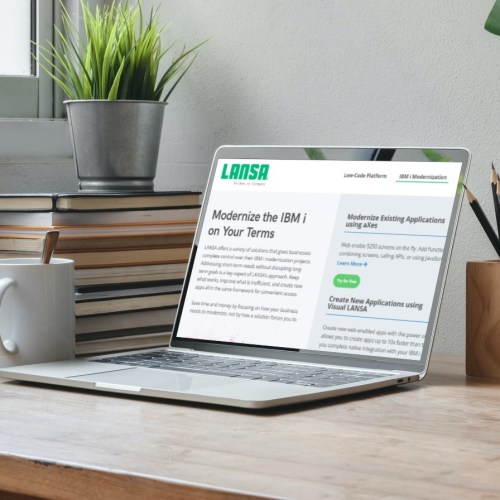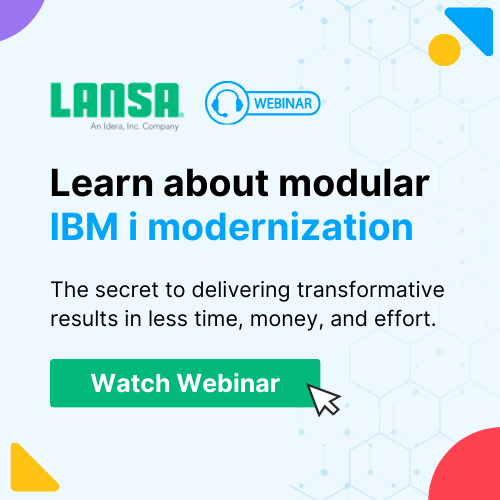Today, organizations are now looking to modernize AS/400 applications and shift to newer, more open platforms due to the requirement to interact with other newer technologies. In this regard, IBM i modernization tools and services play an important role in digital modernization. Since they also help you to improve the IBM i application’s performance by decreasing or eliminating the technical debt.
IBM i AS400 application modernization services digitally transform your existing AS400 or IBM i applications into a modernized cloud or web-based technology resulting in a low-risk and low-cost way to leverage your investment in IBM i (AS400/iSeries).
In this article, we will discuss the concept of IBM i vs. AS400 and the AS400 modernization. Moreover, we will also discuss whether the AS400 is outdated or whether organizations are still using the AS400 applications.
What is IBM i?
The IBM i/AS400 systems were first introduced in 1988, with IBM’s own OS/400 operating system and an embedded database. The hardware and software of AS400 systems have gone through multiple updates, revisions, and name changes. So, It is now commonly known as the IBM i or i-Series systems.
The IBM i AS400 systems are used in different midsize businesses as well as in many Fortune 500 companies. The IBM i AS400 has an extended record of being known for its reliability, scalability, security, and low overall cost of ownership.
Is AS400 outdated?
The AS400 system was introduced in 1988. That’s why most people assume that the AS400 system is outdated. But, this is wrong. Most organizations still use IBM i AS400 systems because they offer various features such as scalability, security, robustness, and flexibility.
The IBM i AS400 systems are still a vital part of many of the world’s top businesses. These IBM i systems are evolving day by day by embracing modern technologies.
What about AS400 modernizations?
AS400 modernization is a process in which you can transform the IBM i 5250 application’s green screen into a modernized graphical interface with minimal or no change to Business logic and database. These modernized applications can operate in multiple browsers, cross-platform operating environments, and mobile devices.
The modern IBM i systems incorporate the latest Artificial Intelligence (AI) and machine learning-based techniques, with powerful software enhancement and CPUs architecture. Moreover, they also support different native and open source programming languages including RPG, Java, .NET, PHP, and C.
What are potential customer pain points about the IBM i AS400 modernization?
When an organization decides to modernize the AS400 system or IBM i platform, a business may face some common potential customer pain points that are listed:
- Rapidly changing conditions
- Low developer productivity
- Lack of talent
- No Easy Way To Innovate
- Difficulty integrating
- Modern usage limitations
- High cost of maintenance
- Scaling to growing business needs
Rapidly changing conditions
Technology evolves at a breakneck speed. So, without application modernization, the IBM i platform will not be able to meet modern needs. IBM i As400 applications have a monolithic architecture. This makes it much harder to adapt to quickly changing market conditions.
This implies you have two options: First, stay up with the competition. Secondly, go out of business. Therefore, you don’t want to wait for a major production failure before starting your IBM i AS400 modernization.
Low developer productivity
Another misperception about IBM i digital transformation is that integrating daily operations with modernization needs might limit the developer’s productivity. On the other hand, IBM i AS400 modernization involves providing a suitable environment for IT to create business solutions.
IBM i application modernization involves assuring the effectiveness of your IT department and implementation teams throughout the transformation process. For this purpose, you need to prioritize orders and create a system for responding to questions as they appear for a successful modernization.
Lack of talent
Modernizing the existing IBM i monolithic systems requires a long time to implement. In addition, organizations have a lack of talent to modernize their legacy systems. Developers need to learn the modern technical skills that are required for IBM AS400 modernization, which is becoming harder to obtain.
Modern developers are unable to transform the IBM i green screens into a modernized look. So, it poses a severe continuity risk to critical procedures.
No Easy Way To Innovate
Every company seeks a competitive advantage. But, businesses must respond quickly to both employee and customer requests. This means that the company must constantly innovate to stay up with the pace of business while also allowing for more innovation.
It’s a fact that trying to innovate without modernizing IBM I apps is difficult. Due to its monolithic structure, growing technical debt, and high maintenance costs, this is the case.
Difficulty integrating
To provide business value today, most business applications rely on third-party solutions. APIs or direct IBM i cloud services integration are used to accomplish this task. Businesses frequently employ third-party software and APIs to perform certain functions such as user authentication and IBM i monitoring to be more efficient. This enables them to concentrate on their primary business requirements. In the majority of cases, these modern solutions require integration.
But, businesses face challenges when they integrate the legacy infrastructure with a modern solution, due to monolithic and isolated data systems. However, using the legacy modernization techniques and IBM i monitoring tools, you can integrate the modernized solution into the legacy applications.
Modern usage limitations
Most businesses think that they can incorporate modern solutions without modernization. The fact is that modernizing the legacy AS400 applications involves challenges if you do it without the modernization tools. Many organizations don’t have enough development expertise to understand the legacy application’s source code. Furthermore, employees are tied to old technologies with inadequate training programs.
Businesses don’t have enough expertise to tackle the IBM i modernization techniques. Inadvertently, the organization implements a poor or partial IBM i modernization plan.
High cost of maintenance
A modernization project is too expensive right now. But, you need to do an investment in your business for application modernization otherwise your IBM i applications ultimately increase technical debt.
Technical debt is a term used in the IT world to describe the quantity of obsolete code or unsupported platforms in a company. Many government agencies experience a significant technical debt problem, and the more debt they have, the further they are from true digital modernization approaches.
Scaling to growing business needs
As a company expands, so do its requirements. In simple terms, scaling a monolithic IBM i infrastructure is challenging. Due to growing technical debt, integrating IT with business goals will always be a challenge. Users construct workarounds when business changes occur without IT’s support, data stops flowing, and the core system delays.
Organizations must scale the IBM i application development and deploy these applications more quickly and transition to a continuous delivery approach. Organizations must offer application upgrades quickly, whether they’re designing solutions to tackle business challenges or providing new customer features.
How do the LANSA IBM i modernization tools fix the AS400 modernization challenges?
LANSA is a leading provider of IBM I modernization solutions and specializes in application development, IBM i AS400 modernization and application integration. LANSA’s comprehensive set of cross-platform IBM i application development tools enables businesses to overcome the challenges of developing and maintaining the IBM i business applications.
LANSA aXes tool specialized in IBM i green screen modernization. It converts the green screen terminal of the IBM i 5250 application into a modern web or graphical interface. You just install aXes product on the IBM i and your employees can securely access their IBM i 5250 applications from any remote web-enabled device.
Developers can use the aXes-Robot application programming interface (API) to construct apps that automate IBM i 5250 applications. You can simulate data-entry actions on any 5250 screen with aXes-Robot. It allows you to integrate and exchange IBM i data between existing IBM i applications and new ones (for example, .NET, Java, etc.).
Why do businesses buy LANSA solutions?
We have mentioned the top reasons why businesses buy LANSA solutions:
- LANSA IBM i AS400 modernization tools help organizations for building more efficient and accelerated business line applications that support cross-platform or flexible deployment and integrations.
- Simplicity and scalability
- IBM i modernization
- LANSA reduces IT costs, increases developer productivity, and increases your ROI.
- Ongoing project support
- Regulation
- POC
Why do people love LANSA?
LANSA helps businesses to modernize and streamline the app dev process. It supports the multi-platform (an application that can run on multiple OS) on-premise deployments with minimum cost.
LANSA offers IBM i AS400 modernizations solutions that are easy to learn and adaptable for modernizing business applications.
Are you ready to modernize your IBM I AS400 business applications? So, you can download aXes for free and try it out. You may easily request a free proof of concept (POC) to confirm that this solution matches your business requirements. You can also contact us for more information about our application modernization solutions.










